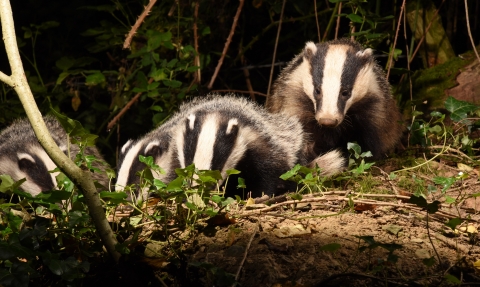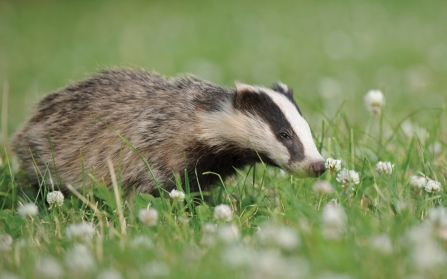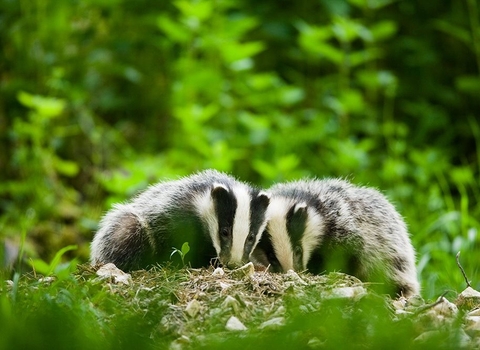
Badger Vaccination in Cornwall
Badger vaccination in Cornwall
At Cornwall Wildlife Trust we have been working on the issue of badgers and TB in cattle for several years, with many groups including scientists from the Zoologicial Society of London (ZSL), farmers, landowners, vets and academics.
During this time, we have vaccinated badgers on several of our reserves and are proud of the work that has taken place with a group of farmers in mid-Cornwall to vaccinate badgers as an alternative to culling.
“Badger vaccination is a promising way to help control TB. It is good to see Cornwall Wildlife Trust showing leadership by vaccinating badgers on its reserves, protecting wildlife while also acting as a good neighbour to nearby farmers."Zoological Society of London
Working with farmers to vaccinate badgers
Vital to the success of vaccinations so far and reducing TB in cattle in the future is a keenness for those involved to work in partnership. In mid-Cornwall, a group of farmers have been paying towards the vaccine and the running costs, with many pre-baiting in the days leading up to the vaccinations. We have raised funds to buy extra cage-traps and other expenses so we can vaccinate further. A team from ZSL does the vaccination and carries out important research, taking blood samples from badgers under anesthetic to test for TB and tracking the impact of vaccination over time.
To find out more about those involved and the work done in 2020, we hosted a livestream discussion . You can watch the full panel conversation back on YouTube (use the timestamps in the description to skip to a particular area of interest).
How does it work?
A team from ZSL does the vaccinating and they are carrying out research in mid-Cornwall as well as in another area of badger vaccination in West Penwith. Blood samples are taken from a proportion of the badgers vaccinated to monitor TB infection in the population over time as the vaccination work progresses. Researchers are also trying a new method to estimate badger numbers using camera-trapping. This should help them to estimate how quickly benefits to cattle are likely to emerge.
Professor Rosie Woodroffe the lead researcher is quick to point out that there is already enough evidence on badger vaccination to know the technique has potential,
Everything we know about badger vaccination suggests that it should reduce TB in the badger population and so help to protect cattle. In fact, research suggests vaccination will be more successful in eradicating TB in badgers over time than badger culling, so it is in farmers’ best interests to expand the use of badger vaccination.Zoologicial Society of London (ZSL)
Cheryl Marriott, Head of Conservation, on working with people to protect wildlife on behalf of Cornwall Wildlife Trust, featuring footage of a badger vaccination:
The science (click to reveal)
- Vaccination of badgers reduces the rate of new infections* in badgers by 76%. Vaccination will not guarantee protection from infection in all individual badgers (this is also true for the human BCG vaccine against TB, which has been used successfully since the 1940s).
- Vaccinating at least one-third of adults in a badger social group reduces new infections* in unvaccinated badger cubs by 79%. This is sometimes known as ‘herd immunity’.
- Each individual badger only needs to be vaccinated once. Vaccination is carried out once per year at each sett for four years. Repeat vaccination is to increase coverage by vaccinating new cubs and adults that might have joined the group over the year.
- Vaccination has no positive or negative effect on badgers that already have TB. Badgers typically live for three to five years, so over a four-year period, vaccination should reduce new cases of TB in badgers whilst infected animals will gradually die off.
- Although the vaccine is live, it is safe and does not lead to shedding of BCG by vaccinated animals; neither does it disrupt badger social groups. Radio tagging studies have also shown that vaccination does not lead to changes in badgers’ ranging behaviour or ‘perturbation’ which happens with a cull as badgers disperse.
- During four years of badger vaccination across a 288km2 area in Pembrokeshire, TB incidence in roadkill badgers declined year on year. The sample size was small, but promisingly, incidence dropped from 19% in year one to 10% in year two, 6.5% in year three and 4% in year four.
- We would expect reduced TB in the badger population to have a knock-on beneficial effect on TB in cattle. If badger vaccination is carried out in more areas, the effects of TB in cattle can be understood better.
- An oral vaccine for badgers is currently in development. This will make vaccinating badgers easier – as and when it is available, programmes can switch to this method.
* Measured using diagnostic tests.

Andrew Mason
The controversy surrounding badger control in Cornwall detracts from working positively in partnership on other measures which will help to reduce and eventually eradicate bovine TB. It can be easy to forget that we all want the same thing- for Cornwall to be free of this disease. We need to work together on this long-term if that vision is to ever become a reality.Former Cornwall Wildlife Trust Trustee

